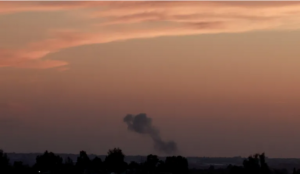US decision to delay arms shipments to Israel could impact IDF’s readiness on other fronts

Smoke billows as an Israeli military vehicle fires near the Israel-Gaza border on 8 May 2024
Yaniv Kubovich writes in Haaretz on 9 May 2024:
The Israeli defense establishment is concerned that the United States’ decision to delay arms shipments to Israel could affect the IDF’s preparedness for potential conflicts on other fronts.
Defense officials are concerned about a deterioration in relations between the Israeli government and the Biden administration and have warned their political bosses that this crisis signifies a shift in Israel-U.S. relations since the war began. Senior IDF officers have cautioned the government about the potential consequences, emphasizing the need for prompt understanding.
The U.S. has stopped shipments of bombs and heavy bomb components for the Israeli air force, which are considered crucial munitions in case of an escalation in the conflict. While security officials believe that halting these shipments will not directly impact the fighting in Gaza, they view it as a troubling development that could affect the army’s preparedness for potential conflicts in other areas.
Moreover, senior defense officials are concerned that Israel’s adversaries may perceive this crisis as an opportunity to undermine Israel’s legitimacy in its operations in Gaza.
A senior Israeli officer emphasized the importance of heeding American warnings, stating that disregarding the decision to halt arms shipments, which comes from President Biden, could lead to a complex situation for Israel.
Officials interviewed by Haaretz noted that initially, the American military operated relatively independently from the IDF during the crisis between Israel and the U.S. However, they now perceive the situation as more intricate. Senior U.S. military officials who recently visited Israel emphasized that the decision rests with the administration, indicating that personal and working relationships between military personnel are not decisive factors in political decision-making processes.
On Wednesday, Biden said he would halt shipments of weapons to Israel if it goes ahead with an invasion of Rafah. “Civilians have been killed in Gaza as a consequence of those bombs and other ways in which they go after population centers,” he told CNN’s Erin Burnett.
“I made it clear that if they go into Rafah – they haven’t gone into Rafah yet – if they go into Rafah, I’m not supplying the weapons that have been historically used to deal with Rafah, to deal with the cities, that deal with that problem,” he continued.
Earlier, Defense Secretary Lloyd Austin said that the U.S. is “currently reviewing some near-term security assistance. In the context of unfolding events in Rafah” in a senate committee.
Austin publicly confirmed the Biden administration paused a pending weapons transfer to Israel last week, over concerns of the looming military operation in Rafah. He is the first senior U.S. official to publicly declare it.
Austin added that the U.S. has been clear from the beginning that Israel “needs to account for civilians in Rafah.” According to him, no final decision has been reached on the matter.
This article is reproduced in its entirety
